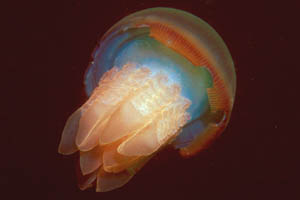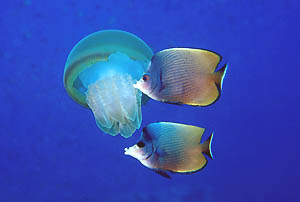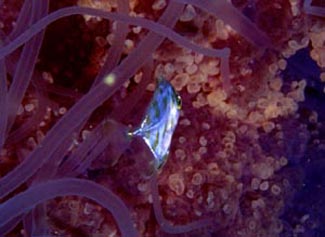|
|
|
Jellies,
jellies everywhere
January, 2003
During the winter months we have experienced a great influx of
Jellyfish in the waters around Oman. The most commonly seen is a
species of the Genus Crambionella shown in the photographs below.

They can be
seen floating or actively swimming in mid-water, piled up in
'drifts' in crevices between rocks and washed up on the beach at
low tide. The generally accepted reason is the high concentration
of plankton in the coastal waters at this time of the year which
provides a rich source of food.
To divers, swimmers and beach strollers Jellyfish are a nuisance.
They belong to the animal phylum Cnidarians. along with corals
and anemones. All Cnidarians have stinging cells called
nematocycts which they use to catch and immobilize their prey.
Divers or swimmers who brush against the tentacles of floating
Jellyfish can get stung. Usually the encounter is harmless
because the nematocysts are not able to penetrate human skin.
However, in the case of a few species where penetration takes
place painful stings will result.
The most dangerous of all Jellyfish - some say of all marine
creatures - is the Australian Box jellyfish (Chironex fleckeri).
The sting of this species is usually fatal.

For the reef fish that live along the coast the influx of jellies
is a valuable source of food. The picture on the right above
shows a Blackspotted butterflyfish (Chaetodon nigropunctatus)
feeding on a Jellyfish. We have seen many with all their
tentacles and part of the body itself, called the bell, eaten
away. If you look closely at the jelly in the photo on the left
you will see that little bits have been nibbled away from the
outer edge of the bell.
Larger Jellyfish are used as a floating nursery by a variety of
fish species. The tiny juveniles shelter amongst the tentacles of
the jelly the same way as clownfish amongst the tentacles of the
Sea anemone.

The photo above shows a very shiny little fish, probably a
juvenile Alectis jack, hiding amongst the tentacles of a large
jelly of the genus Cephea, getting a free ride as well as
protection from predators.
********************************************************